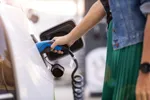André ten Bloemendal, vice president of sales in Europe at ChargePoint
Fleets are the lifeblood of many businesses and essential to everyday life.
Their cost, reliability and physical presence has a huge impact on the running and public perception of your business.
An unprecedented combination of sustainability goals, cost savings and government regulations make now the time for fleets to electrify.
The number of available medium and heavy-duty electric vehicle (EV) models available is expected to double between 2019 and 2023, ensuring that all types of fleets can find the vehicles they need.
But why would you make such an investment in such uncertain times?
How electrification saves money
Early adopters of fleets have realised the 20-25% cost savings of running from greater efficiency, more affordable fuelling and reduced maintenance.
This is expected to grow and by 2040 electric fleets are estimated to have a 15-25% lower total cost of ownership (TCO) than those with internal-combustion-engine vehicles (ICEV).
Electricity is less expensive and offers more predictable pricing than fossil fuel.
It also allows fleets to optimise charging activity for the most efficient and least expensive use of energy, including renewable sources.
Smart charging blends cost optimisation with peace of mind, ensuring that electric fleets are always charged and ready when needed at the lowest cost possible.
While savings will vary by fleet, the opportunity is hard to pass up.
Rapid reduction in battery costs will lead to vehicle cost parity as soon as 2025 for light-duty vehicles.
Due to fewer moving parts, EVs require significantly less maintenance: no oil changes and almost no part replacements.
This not only cuts costs, but also allows EVs to spend more time working and less time under repair orders in the workshop.
Achieving sustainability targets with electric fleets
It's not just in your pocket that you will see the benefits.
A growing number of organisations have established ambitious sustainability goals that are driving new business choices, even if you haven’t, your customers will be judging you and your competition by this measure.
Consumers increasingly expect fast delivery and sustainability: 80% of shoppers want same-day shipping and 81% of consumers feel strongly that companies should help to improve the environment.
Electrification offers companies the opportunity to combine sustainability with efficiency and cost savings.
Going electric can lower greenhouse gas emissions by half or more, depending on how the power used to charge the fleet is generated.
Estimates will vary by vehicle type, local energy source and miles driven, but through smart charging services it has never been easier to give a straightforward, regular and accurate account of your CO2 savings to customers and shareholders.
Commitments for sustainability purposes have been a huge driver for electric fleet adoption.
The Climate Group EV100, The Climate Pledge and Corporate Electric Vehicle Alliance have played a huge role in increasing adoption as big brands adopt EV fleets to achieve their sustainability goals and commitments.
For example, the BT Group is an EV100 member and has committed to convert its commercial vehicles to electric where it is the best technical and economic solution by 2045.
IKEA has committed to zero-emission deliveries as part of a quest to be climate-positive by 2030. Deliveries may already be emission-free in Amsterdam, Los Angeles, New York, Paris and Shanghai.
As even more models become available across all vehicle classes, sales will continue to grow and electric fleets will be able to reduce costs, meet regulations and achieve sustainability goals.
The financial and sustainability advantages of electrification are leading to major corporate fleet commitments and significant sales growth for electric fleet vehicles.
As more companies choose EVs for fleet and other purposes, they will need to rely on smart EV charging solutions that can keep electric vehicle fleets in service at low cost with optimised energy use.
If your business to stay competitive from a public relation, environmental and financial standpoint, now is the time to move.
















Login to comment
Comments
No comments have been made yet.